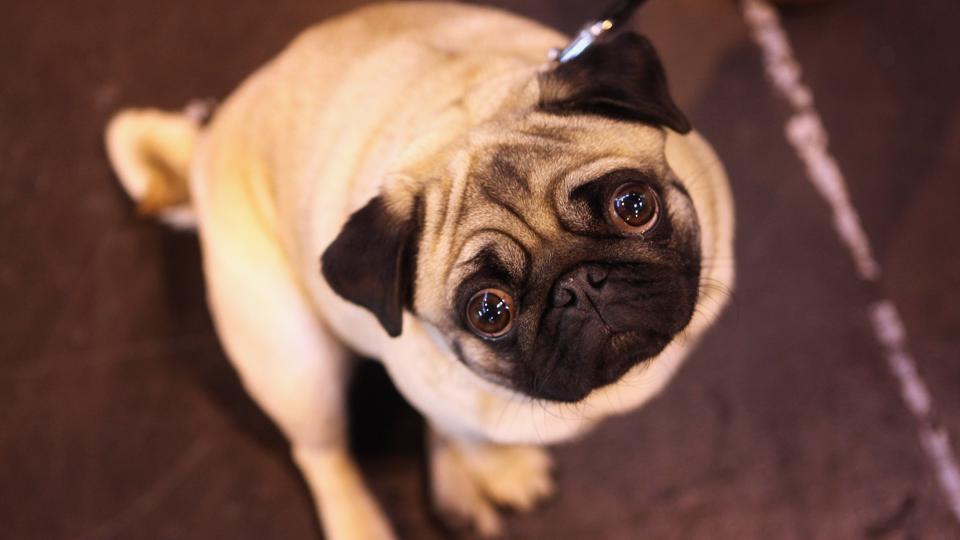Table of Contents
Pugs are beloved for their charming personalities and distinctive looks, but they are also prone to several health issues due to their unique anatomy. Understanding the common ailments in Pugs can help you provide better care and ensure your Pug leads a healthy and happy life. This guide covers the most frequent health problems Pugs face, their symptoms, and possible treatments.

Brachycephalic Obstructive Airway Syndrome (BOAS)
Brachycephalic Obstructive Airway Syndrome (BOAS) is a condition affecting flat-faced breeds like Pugs. It is caused by the physical structure of their skull, leading to breathing difficulties. BOAS is one of the most common ailments in Pugs.
Symptoms: Noisy breathing, snoring, gagging, and difficulty exercising.
Treatments: Weight management, avoiding heat and strenuous exercise, and in severe cases, surgical correction of the airway.
Hip Dysplasia
Hip dysplasia is a genetic disorder that affects the hip joints, leading to arthritis and pain. Though more common in larger breeds, Pugs can also be affected by this common ailment in Pugs.
Symptoms: Limping, reluctance to run or jump, and difficulty rising from a lying position.
Treatments: Weight management, anti-inflammatory medications, and in severe cases, surgery.
Patellar Luxation
Patellar luxation occurs when the kneecap dislocates from its normal position. This condition can be congenital or the result of trauma, making it one of the common ailments in Pugs.
Symptoms: Intermittent lameness, skipping or hopping gait, and pain in the knee area.
Treatments: Weight management, physical therapy, and in severe cases, surgery.
Skin Fold Dermatitis
Skin fold dermatitis is a common issue in Pugs due to their facial wrinkles. These folds can trap moisture and bacteria, leading to infections. This is another common ailment in Pugs.
Symptoms: Redness, swelling, odor, and discharge from the skin folds.
Treatments: Regular cleaning of the skin folds, topical antibiotics, and in severe cases, surgical removal of the folds.
Corneal Ulcers
Pugs have prominent eyes that are prone to injuries and ulcers. Corneal ulcers are painful and require prompt treatment to prevent complications. This eye issue is a common ailment in Pugs.
Symptoms: Squinting, excessive tearing, redness, and pawing at the eye.
Treatments: Topical antibiotics, pain relief medications, and in severe cases, surgical intervention.
Entropion
Entropion is a condition where the eyelid rolls inward, causing the eyelashes to rub against the cornea. This can lead to irritation and damage to the eye, making it one of the common ailments in Pugs.
Symptoms: Squinting, excessive tearing, and redness around the eye.
Treatments: Surgical correction of the eyelid.
Pug Dog Encephalitis (PDE)
Pug Dog Encephalitis (PDE) is a fatal inflammatory brain disease unique to Pugs. The cause is unknown, and it progresses rapidly. This serious condition is among the common ailments in Pugs.
Symptoms: Seizures, circling, disorientation, and lethargy.
Treatments: There is no cure for PDE, but supportive care and medications can manage symptoms.
Obesity
Obesity is a common issue in Pugs due to their love for food and low activity levels. It can exacerbate other health problems and decrease life expectancy. Obesity is a common ailment in Pugs that requires vigilant management.
Symptoms: Excessive weight gain, difficulty breathing, and reduced mobility.
Treatments: Controlled diet, regular exercise, and weight management programs.
Dental Problems
Pugs are prone to dental issues due to their crowded teeth. Plaque and tartar buildup can lead to gum disease and tooth loss, making dental problems a common ailment in Pugs.
Symptoms: Bad breath, difficulty eating, and red or bleeding gums.
Treatments: Regular dental cleanings, brushing teeth at home, and dental chews or toys.
Allergies
Pugs can suffer from allergies, which can manifest as skin problems, respiratory issues, or digestive disturbances. Allergies are a common ailment in Pugs and can significantly impact their quality of life.
Symptoms: Itching, redness, hair loss, sneezing, and gastrointestinal upset.
Treatments: Identification and avoidance of allergens, antihistamines, and special diets.
Collapsed Trachea
Collapsed trachea is a condition where the windpipe partially collapses, leading to breathing difficulties. This is a serious and common ailment in Pugs due to their unique anatomy.
Symptoms: Honking cough, difficulty breathing, and exercise intolerance.
Treatments: Weight management, cough suppressants, and in severe cases, surgery.
Conclusion on Common Ailments in Pugs
Understanding the common ailments in Pugs is essential for providing proper care and ensuring a long, healthy life for your pet. Regular veterinary check-ups, a balanced diet, and a healthy lifestyle can help prevent and manage these conditions. For more pet care tips and advice, visit our Pet Care Guide.
FAQs on Common Ailments in Pugs
How often should I take my Pug to the vet?
Regular vet visits are crucial for early detection and management of health issues. Annual check-ups are recommended, but more frequent visits may be necessary for senior Pugs or those with chronic conditions.
Can diet help prevent health issues in Pugs?
Yes, a balanced diet can help maintain a healthy weight, support joint health, and prevent dental problems. Consult your vet for a diet plan tailored to your Pug’s specific needs.
Are Pugs more prone to certain health issues than other breeds?
Due to their unique anatomy and genetic predispositions, Pugs are more prone to respiratory issues, joint problems, and skin conditions compared to some other breeds.
What can I do to help my Pug breathe better?
Maintain a healthy weight, avoid exposure to extreme heat, and use a harness instead of a collar to reduce pressure on the trachea. In severe cases, consult your vet about surgical options.
How can I keep my Pug’s skin folds clean?
Regularly clean your Pug’s skin folds with a damp cloth and dry them thoroughly to prevent infections. Use vet-recommended cleaning solutions if necessary.
What should I do if my Pug shows signs of Pug Dog Encephalitis (PDE)?
If your Pug exhibits symptoms of PDE, seek immediate veterinary care. Although there is no cure, early intervention can help manage the symptoms and improve quality of life.











